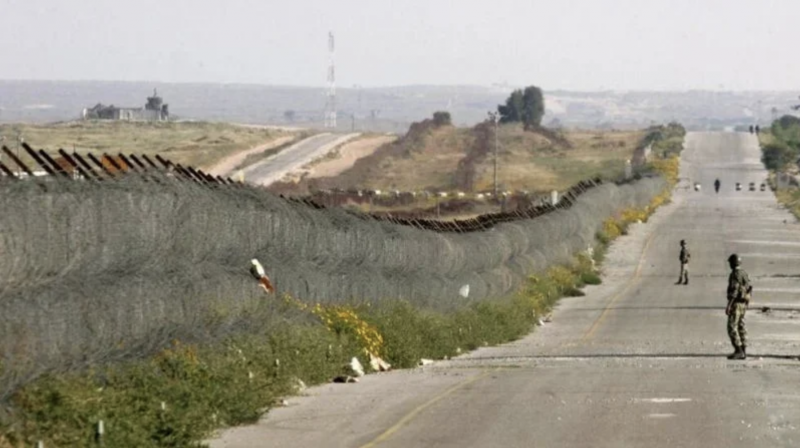
Egyptian soldiers patrolling a road parallel to the Philadelphia Corridor, March 19, 2007. (Credit: Cris Bouroncle/AFP archives)
Egypt’s reaction was under particular scrutiny after the Israeli seizure of the Rafah crossing on Tuesday.
While images of the Israeli flag flying over the crossing that is located at its border circulated in media outlets and on social media, Cairo showed restraint in reaction to this deployment, which constitutes a violation of the peace agreement signed between the two neighbors in 1979.
Concern about the humanitarian consequences of taking “operational control” of Gaza’s only gateway to the outside world prevailed in official statements, rather than national sovereignty defense.
“It is the main lifeline of the Gaza Strip and the safe outlet for the wounded and sick to exit to receive treatment, and for the entry of humanitarian and relief aid to our Palestinian brothers in Gaza,” said the Egyptian Foreign Ministry in a statement.
Citing a “dangerous escalation,” Cairo urged Israel to exercise “maximum restraint” to avoid undermining the cease-fire efforts.
On Tuesday, the authorities’ weak response prompted criticism on social media. In parallel, a video was widely circulated showing a young Palestinian who had managed to cross over to the Egyptian side being assaulted by Egyptian soldiers.
Several observers believe that Cairo does not want to offend Israel too directly, from which it hopes as a mediator to extract concessions with a view to a truce, accepted by the Hamas movement.
The country would then go down in history as having demonstrated diplomatic prowess. But above all, it would hope for an end to the Houthi attacks in the Red Sea, which have deprived it of billions of dollars in revenue from the Suez Canal, according to the Israeli daily Haaretz.
The Philadelphi Corridor
Haaretz reported that Egypt is even pleased with Israel’s initiative and that Israel told Egypt about it in advance.
This prospect is linked to its main concern that thousands of Palestinian refugees will forcibly cross the border.
Since the beginning of the war, the country has insisted on its firm opposition to the transfer of Palestinian civilians to its territory, fearing that an influx of population would destabilize security in Sinai.
The army has been waging an anti-terrorist war against Islamist factions there for several years. Since February, dozens of tanks and armored vehicles have been deployed in the northeast of the area, anticipating possible infiltration.
In early May, an official delegation met with the main Sinai tribal chiefs to urge them to collaborate with the army in preventing “any infiltration of Palestinians” into the various localities. A paramilitary militia was set up for this purpose.
Cairo, backed by the US, is opposed to a major offensive in Rafah, where over a million Gazans have taken refuge. But another red line is the seizure of the Philadelphi Corridor, which could cause a stir in Tel Aviv.
Formerly known as Saladin Axis, this buffer zone along the Egyptian side of the border is considered by Israel to be a particularly porous smuggling strip of land for Hamas.
Egypt was granted control of the corridor in 2005, the year Israel withdrew from the Gaza Strip. The country was then allowed to deploy a contingent of 750 guards along its border with Gaza to prevent the infiltration of Palestinian militants into Sinai.
As a result, Israeli troops cannot enter the area without Egyptian approval. Israeli Prime Minister Benjamin Netanyahu has repeatedly seemed to ignore this condition since the start of the war.
In December, he loudly proclaimed his intention to take control of this corridor to achieve his war aims.
At the time, the Israeli government told Cairo of its plans to have its security personnel conduct joint patrols with the Egyptians, and requested that sensors be installed along the Philadelphi route to be alerted in case new tunnel networks are discovered.
These proposals annoyed Egypt, which retorted that it has the necessary capacity to handle its own national security and that an Israeli presence would undermine its sovereignty.
Lasting control?
On Tuesday morning, after storming the Rafah crossing, Israel’s 162 Division entered into 3.5 kilometers along the Philadelphi corridor, up to the Kerem Shalom crossing. In an interview with CNN on Wednesday evening, US President Joe Biden said the seizure of the Rafah crossing is causing “problems” with Egypt.
If Cairo refuses to permanently authorize Israeli troops to establish control over the Philadelphi corridor and the crossing, Tel Aviv may have another idea in mind.
According to Haaretz, Israel is considering transferring control of the Rafah border crossing to an American private security firm employing former elite soldiers, once it has completed its operation in the city. The White House has not yet confirmed this information.
Senior Palestinian Authority official Hussein al-Sheik has ruled out the possibility that the PA will take over the crossing, as rumors in the Israeli press reported by Le Monde suggested.
In the meantime, Egypt, the first Arab country to sign the peace treaty with Israel and whose population supports the Palestinians, is walking a tightrope to ensure that respect for its national security remains a red line.
This article was originally published in L'Orient-Le Jour. Translated by Joelle El Khoury.
